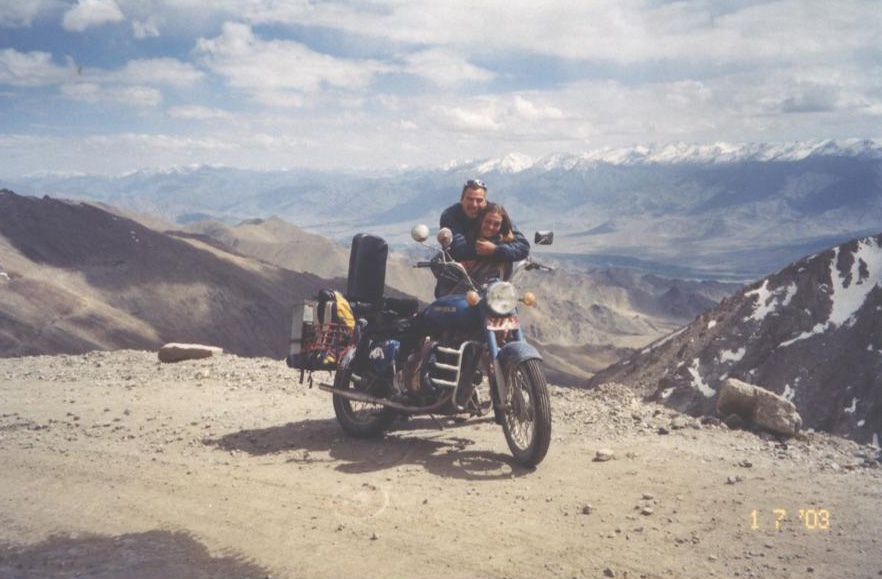We crossed the Chinese border through a concrete building. Our luggage was X-rayed, our mechanic tools were inspected (due to the X-ray), and we said good-bye, Gal with tears in her eyes.
Sort of a normal border crossing.
We cycled 7 km of no-mans land, in which other travelers had to hitch trucks and wait to be checked (who would believe the bike would be quicker), we reached 8,000km on our odometer and we reached the Kyrgyz side.
It looked like an army base from the 50's. Small wood shacks, with asbestos roofs, junk everywhere, dirt roads – a mess.
We quickly passed customs, no computers only people writing down our details, sort of funny.
One guard asked Rami to open one of the trailers, but very quickly became board of it and sent us inside the country…
We didn't reach too far. Immediately after the border was a big truck stop, with what we will call 'a village' next to it. There were maybe 200 trucks, probably waiting to be loaded with Chinese goods, arriving on trucks from China. We were told that 1 Chinese truck, carrying 100 tons of goods through China is being unloaded to 7 Kyrgyz trucks on the way to Osh (probably 3 of them will break down on the way), due to the bad condition of both the roads and the trucks.
The village was like something taken from the movie "Mad Max"; old caravans spread around, as shops or houses for whole families, 3-4 concrete houses – the hotels, everything improvised, built of old metals, old cloth and mainly OLD!
There is no running water. Pluming and running water are sparse in Kyrgyzstan, the plumbers have probably left the country with the Russians in 1992, but, there isn't even a river over there! Eater is being brought by tractors from a river 11km away!
Sometimes, during the evening, there was electricity, we were told. This was more than new or different for us. Just a few kilometers away was China, modern China, with its infrastructure (well, they did have problems with Toilets…), and now this.
It was 17:00, and we were sort of too lazy to continue, knowing there is nothing much for many km, so we took 2 beds in a dorm and wandered about, investigating.
It was incredible! We have just crossed the border and everything has changed. Everybody was speaking Russian (also Kyrgyz, but with us they spoke Russian), all the food and the faces have changed. Just crossing the border we moved from a 'Chinese' place to an 'ex-Soviet' 3'rd world country. It was like in a movie from east Europe: the Russian trucks and the funny old Russian cars, the canned salted fish and the vodka – Russian, the drunks the music, the faces, the blond hair – all Russian!
And we loved it! It made us laugh, but we only smiled, thinking of the resemblance to the movie "Black cat, white cat". Some truck drivers, eating at our hotel, offered us some sardines with fresh Nan-bread and a shut of vodka. It was fantastic. These tastes we haven't had since Israel, so different from the oriental food of the last 8 months. We finally understood we have crossed from the Far East to something else – Central-Asia.
We communicated vary easily with the locals, using our Russian phrasebook and a lot of common sense. It was all just, well, easy.
Later that evening we met Maddar, from Osh, who speaks excellent English, and talked about many interesting things. He mentioned "Ш О С", the big central Asia conference, which will be held on 16/08, we may have some problems, due to its importance.
Our first day in Kirgizia passed with good vibes.



 Truck town.
Truck town.The Horseman 27/07/07
We started cycling in Kyrgyzstan, our first ride, to Sary-Tash, 88 km of the 250 km to Osh. It was sort of straight west, a few km from the Pamir mountain range, the border between Kyrgyzstan and Tajikistan. The scenery was incredible, one of the most beautiful we’ve seen on this trip.
The road was more than terrible. The first 20 km were paved (maybe ‘historically paved’), but after that it was the worst road we’ve had (and, with all due respect to Chinese roads, up at the Tibetan plateau we had our share of bad roads). It wasn’t even dirt, just big rocks that have been thrown to create a road. The paved part went nicely. We passed Nura, a small village (our first ‘East-European’ looking village as opposed to Chinese or Uygur villages) just beneath the mountains.
Than, while climbing a hill, we met a horseman. He came near us, much faster than us, and started talking with Rami, “Atkuda?” and the usual questions that we quickly learned to spot. He said he comes from Nura, on his way to Sary-Tash, where his wife & child are. It should take him 1 day. We found that hard to believe, but, while climbing a hill, he took a detour through the valley, and as we zoomed back down he slowly appeared around the corner. We started believing, and played with the thought that in this country people still use horses for transportation (and we were right – we’ll talk about that and 3’rd world Kyrgyzstan later).
The horseman talked with us between every detour, as we waited for the police post to take our passport details and as we were pushing our bikes in the worst road we’ve met so far.
He offered to help every now and then, but we kindly refused, trying to explain it was our trip (and a bit afraid he’ll not handle the weight and might break something).
After a few slow kilometers of pushing, we reached a dirt road, leaving the “highway”. The horseman told us to take it, it’s shorted and better for bicycles (in China we would have never understood someone trying to tell us a think like that – it’s us and all other foreigners, not them). After a short debate, in which he waited patiently, we took the detour – and the dirt road was good! It was toughly packed, so no dust was flying, and better, we actually managed to cycle. And most important – we were away from the road, the trucks, the noise – we were trekking! We were thrilled! The scenery was fantastic, this horseman teaching us Russian, “Deroga” – road, with the year “1939” scribbled on the sand, as opposed to the “new” road, from 1956, things like that, and we were cycling the whole way!
After a few kilometers we reached a short but impossible climb. The horseman and Rami, pushed Gals’ bike sort of easily, but had to catch their breath after barely managing Ramis’ load. We rested and shared his & our food, on the most picturesque hill.
We continued cycling, but, on the next though climb, we tried something new: we tied a rope from the horse to Ramis’ bicycle frame and up we went. Rami had to run, to keep in paste and balance the bike. This was the first time we hitched a horse, the first of many.
At around 16:00 we wanted to eat. The horseman told us we’ll be reaching friends soon, we’ll eat there.
10 minutes later we reached a few Yurts (a nomadic tent). We were welcomed with tea, Nan-bread, cheese, yogurt and butter, all local products. We were offered to sleep there. We were very tired, and in no special hurry, the Pamir range just in front of us, an almost full moon, a friendly host, interesting way of life, so we seceded to stay. The horseman continued, hoping to reach Sary-Tash around 21:00 after slow cyclists slowed him down all way.
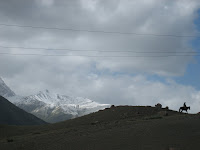 The horseman.
The horseman.



 Hitching.
Hitching.

The Pamir Range 28/07/07
Not much to say, but the scenery was so amazing, that it earned a sub-title!
We left the Yurt. We were debating what can we give them, the only thing we have is money… but then the grandmother (who was sort of the dominant figure) put an end to it by saying “100”. So, our first night, in a private Yurt (later we heard from tourists that 10 people is a typical figure for a small Yurt), with lunch, dinner and breakfast (Nan bread from lunch, lots of yogurt, cheese and tea) was about $2.5. No shower, actually no facilities, but at least not expensive and quiet.
Oh, and, during the previous evening the family goats returned from herding all day. For some reason they circled our Yurt and stepped all over our bikes, which were lying on the grass. We decided to put the bikes inside the Yurt. Lucky us, it snowed the whole night, and in the morning there was fresh snow everywhere (except on our bike).
We left. We pushed up a bit, thinking we’ve reached the pass, but during the next 10 km we found out again and again that there is another hill. And, we connected to the highway, the bumpy, rocky noisy (actually the trucks drove at our speed) highway. But, all day long we had the Pamir range, over 7,000m just to our left. It was so close we could almost catch it! On the right we had more beautiful mountains, but who’s looking right?
On the way down from the pass (not really a pass, ~3,500m) to Sary-Tash we met our first cyclist of the day. We were a bit excited, exchanged info, and money (Chinese-Kyrgyz) and continued. We found the old dirt road so cycling was smoother for us and all the cyclists we met. 2 hours later we met our second cyclist of the day. We started getting the feeling we’re not in China anymore… 2 cyclists on the same day – in China we didn’t see 2 cyclists in 2 months!
Sary-Tash was far less than what we hoped it would be. It was a small village with no running water, a shop or two and greedy locals, looking for two cyclists/tourists they could rip off. At the time we thought it was a mistake, like meeting twice cyclists (“it’s a mistake, it can’t be”), but, with time we learned the tourism has changed many of the people; we’ll talk about it later.
After checking out the “hotel”, we decided to sleep on the floor at a house of two nice children, due to the “too short for Rami” beds and the lack of the technology of opening the windows. We quickly learned that the “opening” technology of windows has not yet reached Kyrgyzstan. Maybe it’s their fear of the cold (average winter minimum is -24 cel). Any way, we quickly learned from the locals to sleep on the tables outside.
The 10 year old child from our guesthouse took us to the shop. He was very irritated when a local drunk, one of a million (we’ll talk about it later), joined us. Later, at night, when the father came home and fell asleep, drunk, on the kitchen floor we understood why.
Before departure we had our first argument about the payment (the parents wanted 5 times the price the kids told us). We quickly learned to always check the bill. Almost always $1-2 were mysteriously added.






 Sary-Tash.
Sary-Tash. Marcello - The Italian cyclist climbing.
Marcello - The Italian cyclist climbing. A truck cooling down.
A truck cooling down.




 Our campsite.
Our campsite.
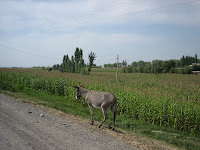 To Osh.
To Osh.

 To Bishkek.
To Bishkek.

Picture! Picture! A night in a village.
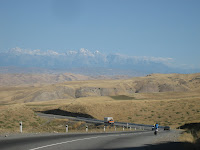







 What could be more Communist?
What could be more Communist?
 Lake Toktogul.
Lake Toktogul.




Shooting stars, 09/08/2007
We had a 2,000m climb to the Ela Bel pass (3184m).
After about 1,000m it was getting dark and we started looking for a place to sleep. Due to rumors, we preferred camping in a yard of locals.
We saw a single small house across the river, between the trees, under a snow peaked mountain.
We crossed the river on an improvised bridge and were welcomed to camp.
We let the baby use our thermometer and gave them medication, and were thanked with big smiles and fantastic confiture made of barriers.
Before going to sleep we spread our amazing plastic cover on the grass and lay a bit to watch the million stars. Visibility was perfect.
In less than a minute Rami saw a shooting star. Gal didn’t believe because she always misses them. Before we had time to argue, we both saw another shooting star. In the next 2 hours we lay, despite the cold, and spotted an average of 1-2 shooting stars per minute. Rami spotted one on the right, while Gal saw another on the left.
How can one share an experience like this?
Two days later a few tourists we met told us about the meteor shower the missed two days earlier, due to bad visibility in the city.
 Camping with the locals.
Camping with the locals.


 Trailers!!!!
Trailers!!!!
 Honey stalls.
Honey stalls.


 Ala-Bel pass.
Ala-Bel pass.




 Go! Go! Mongol Rally!
Go! Go! Mongol Rally! The dark tunnel.
The dark tunnel.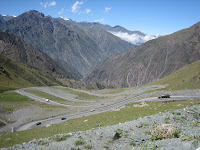
 Beautiful downhill!
Beautiful downhill!

 Leaving the mountains.
Leaving the mountains.A new café in town 12/08/07
We returned to civilization. We had a fantastic day, with a quick 900m climb, a 3km tunnel and 80km of downhill. The tunnel part was easy. An hour before reaching the tunnel we met Emma, Jayme, Raphael and Tom, group “Mongol – Manor” from the infamous Mongol Rally.
They waited for us longer than we expected because our Nelles map lied to us about the altitude of the tunnel (500m higher). Obviously, Gal will not cycle the 3km long, claustrophobic, unlit, unventilated, 40 year old soviet tunnel. Jayme was volunteered for the job and Gal sat comfortably in the car.
We reached Sosnovka, but it was too small a place, or we just wanted to be closer to Bishkek, so we continued the last 20km of a soft downhill, enjoying the late afternoon, Fields around us and the giant mountains just behind us.
We reached the junction, right – 20km to Bishkek, left – 6km to Kara-Balta. We just wanted to sleep in a cafe, cheep, simple, on the way – what we learned to appreciate. But, it wasn't as easy as in more rural areas (north Kyrgyzstan is very different from the south, more Russian oriented than the Uzbek south). Everybody directed us to Kara-Balta (and its’ expensive guestintzias). We really didn't want the 6 km there and back, so we asked about sleeping on the way, trying to avoid the drunks and their tiring small talks. After about a kilometer we saw people partying in a cafe on the left. We went to investigate, ask about a hotel, and hoped for the best. The small drunk crowd came over and before we had time to decide the took us in and told us “Every Little thing’s gonna be alright”.
While the loud, Russian dance music was playing, we slowly told our story, but then Anna abruptly interrupted and said: “food!”. We followed her inside, seeing she understood our situation: a long cycling day with only pretzels and cookies.
Inside were tables with lots of food and drinks on them. We understood this was a kind of a function or, as Rami says: “We've hit jackpot!”.
It was a new cafe, the opening event, with relatives and friends. Olga, the owner came over and greeted us as her guests, poured us all Vodka and toasted the first of many...
Warm food was put on the table. We started to eat, starved and after a few minutes we noticed we were the only ones eating. Kosta, siting to our left, saw our embarrassment, smiled, took some food to his plate, mate a ‘forget it’ hand motion and joined us. Since that gesture we felt comfortable, and using our phrasebook and Kostas’ bits of English and quick mind, we talked quite a bit.
The evening passed between eating a lot, drinking a lot and a bit of dancing (all in our cycling clothes) quite similar to weddings. When most of the guests left, they led us to a small room with a bed waiting for us.
We woke up around 08:00. Olga, the owner, invited us for breakfast, but first – a toast! (Gal managed to avoid the shot of Vodka...)
 Olga.
Olga.
Visa Problems 15/08/07
We reached Bishkek. Not too difficult, even quite easy compared to what’s ahead;
we got our Kyrgyz visa at Urumqi, quickly, reasonably cheap, with no problems, only the stress of not knowing if it’s possible or not.
But, here it’s a different story. People talked about difficulties in getting visas for the ex-Soviet Central-Asia countries, but, here in Bishkek it’s insane! Everybody are stuck here for over a week, for onward visas. Our story is just one of many. It’s the talk of the day: “What’s new?”, “They say we should call them (Uzbek embassy) on Monday”.
So, our story started 10 days ago, in Osh, where, small Asia, we arrived to a small hotel, where Yoav, Liron (his girlfriend), Erez & Matan were staying. We met Yoav at the Youth Hostel (does it mean we are still youth?) in Urumqi, over a month ago. They are cycling Asia, similar to to us (but not as good!!!). Very few Israelis cycle-tour. So, in Osh, exchanging info, they informed us we’ll need a “Letter Of Introduction” (LOI) for the Uzbek visa. We thought that crossing the whole country, to get the Uzbek visa, then cross back south is bad enough, but, now, 10 days till we get the $30 per person LOI! So, our fantastic Deputy Director of Operations (Rachel, Ramis’ mom) started working on it. Nisan, from “Asia Travel” (Nisan741@mail.ru, +972-3-5256677) gave us the letter, faster & cheaper than the famous “Stantours”.
So, we called the Uzbek embassy on Wednesday, to be ‘on the list’ for the following morning, but there’s a big political conference in town ("Ш О С"), so, they said to call on Monday. Rami said that Monday was 2 days ago, but that was not what they meant. We were crashed. We were devastated. Well, we were just frustrated. Only after receiving the Uzbek visa we can work on the 5-day transit visa to Kazakhstan, which takes another 3 days, so we can cut through Kazakhstan, straight to Tashkent, and not go back the long way we came.
We called Tolon, a local we met up at the mountains, 100km south of Bishkek. Elura, his Russian speaking wife, called the Uzbek embassy and this time they told her we should call on Friday morning (Rami calculated that’s 2 days ahead). Elura told us we should try go there on Friday morning, there’s a chance they’ll let us in.
2 d a y s p a s s e d . . .
On Friday 10:00 we sat with 4 of our Japanese friends (from Sakura guesthouse, the Japanese hound) outside the embassy, waiting for the LIST to end. After all the people left we tried our luck, but no luck. So we asked Elura to call them. She told us that the Embassy worker is tired of hearing about the Israelis and we should arrive on Tuesday, we’ll be on the LIST, and she hang up on poor Elura.
F r i d a y p a s s e d.
S a t u r d a y p a s s e d.
S u n d a y p a s s e d.
M o n d a y p a s s e d.
On Tuesday 10:00 we sat with 4 of our Japanese friends...but we were on the LIST!!!
A quick $144, come back at 15:00, 2 minutes and we had the visas! (plus a receipt for $144).
All our Japanese friends got their 10-day-wait visas as well and Sakura guesthouse was happy that day (except for the owner who lost 10 clients the following day). We celebrated with a sauna and beers.
It was 21/07/07, 4 days to the end of our Kyrgyz visa, tomorrow (Wednesday) the Kazakh embassy doesn’t work, so we must hitch back south, towards the Fergana valley, waste more precious time.
TO BE CONTINUED...
 Cooking at Sakura guesthouse.
Cooking at Sakura guesthouse. We're on the LIST!!!
We're on the LIST!!! Part of the Sakura gang.
Part of the Sakura gang. Leaving Bishkek.
Leaving Bishkek.
 Our last 2,000m downhill in Asia.
Our last 2,000m downhill in Asia.Alcohol
Where there is man – there is alcohol (and cigarettes).
Throughout our trip, people around us were drinking and so were we (usually beer). But never as ferociously as in ex-Soviet Central-Asia. As we entered Kyrgyzstan, the friendly truck drivers at the simple hotel invited us for Vodka, and since then we've been seeing it everywhere. And, mainly not beer, but big bottles of cheap Vodka (Russian, Kazakh or local).
One example of many was a drunk on a horse, riding next to us on the main road. It was very dangerous and the only way to get rid of him was by asking villagers to take him away.
In the big cities (Bishkek) you see many of them lieing drunk or unconscious in city parks, day & night (like bits of the Russian immigrants at the Yarkon park, in Tel-Aviv).
The worst was at the junction/bus-station near Kara-Balta, where we hitched back from Bishkek to the Uzbek border. We were waiting for a truck for about 3 hours. During this time our company was a drunk mother and her child and another drunk. Each party was coming over, stinking from alcohol, crying and begging, disgustingly waiting to shake Ramis’ hand (Rami was disgusted – yah?). Gal prayed for a truck to save us from this disgusting junction.
Talking with the locals we were told that it’s not as bad as in Russia; but many of them still freeze to death in winter nights.
Goodbye Kyrgyzsia
We've been a short time in Kyrgyzstan, so it’s difficult to try and ‘figure it out’.
Kyrgyzstan was easy. Easy in cycling standards. Everything is near by, people everywhere, shops, food (bad food) and tourists.
It was a nice change after China; the Russian influence was fantastic, after 8 months in the ‘Orient’ – a different Communism. If not for the last 10 wasted days, everything would have been sort of nice.
3 things that disturbed us: the alcohol (which we talked about), the greediness, due to too many tourists in such a small country (sounds like Laos?) and the poverty with it’s bitterness. Throughout our trip we saw people with less, but satisfied. We hope you understand what we mean.
